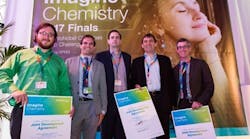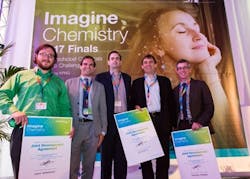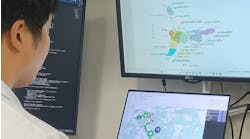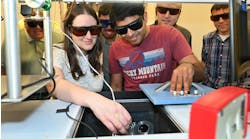AkzoNobel, Deventer, The Netherlands, has announced the winners of its inaugural Imagine Chemistry Startup Challenge to help solve real-life chemistry-related challenges and to uncover sustainable opportunities for the company’s Specialty Chemicals business.
A jury made up of AkzoNobel business and R&D leaders selected 10 startups from 19 finalists to receive customized support to scale-up their processes and bring them to market. Three overall winners — Ecovia Renewables, Industrial Microbes and Renmatix, all from the United States — have been awarded joint development agreements (JDAs) with AkzoNobel’s Specialty Chemicals business.
Figure 1. From left, Jeremy Minty and Drew Hertig of Ecovia Renewables, Jeremy Austin and Charles Sanderson of Renmatix, and Noah Helman from Industrial Microbes display their joint development agreements from AkzoNobel. Source: AkzoNobel.
Ecovia Renewables. Jeremy Minty and Drew Hertig represented the Ann Arbor, Mich.-based company at the ceremony. The firm got the nod for its fermentation technology to make polyglutamic acid (PGA), which can be used to produce thickeners for personal care products and other applications.
Founded in 2014, Ecovia Renewables builds on research from the University of Michigan where Minty’s team designed, constructed and fine-tuned synthetic microbial ecosystems. “Our first proof-of-concept synthetic microbial ecosystem involved one-step production of isobutanol from lignocellulose. Since then, we’ve expanded to engineer microbial co-cultures that enable more efficient, cost-effective routes for producing a variety of biochemicals like PGA from renewable biomass resources,” says Hertig.
The company’s BioGel suite of PGA formulations can be tailored for many end applications, including ingredients for skin care and cosmetic formulations and superabsorbent polymers (SAPs) for absorbent hygiene products like infant diapers. “We also can expand into food, agriculture, and other industrial applications that need a functional, bio-based alternative for conventional acrylate and acrylamide polymers, derived from non-renewable sources,” notes Hertig.
“Our novel route for PGA production, leveraging innovations in fermentation, purification, and downstream derivatization technologies, can reduce production costs by up to 96% and enable new applications and markets for PGA that were not previously economical. Our platform complements AkzoNobel’s downstream, distribution and commercialization capabilities with our fermentation expertise and core process technology,” adds Hertig.
Ecovia has demonstrated proof-of-concept for its process and products at bench scale, and likely will deliver a pilot-scale (approximately 100-L to 1,000-L fermentation capacity) demonstration plant in 2018. “We will continue to work on strain and fermentation improvement, and optimizing downstream processing and PGA end-products before a full pilot-scale demonstration,” says Minty. “After demonstrating the process and end products at pilot-scale, we expect to further scale-up to commercial production (for initial markets and applications) in 2019 and 2020, with increased capacity to be added later as we launch additional products,” he adds.
Ecovia still faces some challenges developing and scaling up its co-culture process, as well as selling PGA products in new markets. “As with any new bio-process, we will need to demonstrate performance at scale to complete technical de-risking of the process. We don’t see many issues with obtaining eco-certifications and are confident we will pass all regulatory hurtles in the U.S. and European Union,” notes Minty.
Industrial Microbes. Emeryville, Calif.-based Industrial Microbes, a synthetic biology startup represented at the finals by Noah Helman, has developed a way to convert inexpensive hydrocarbon gases to valuable chemical products using fermentation of engineered microorganisms.
“Our winning solution described a method for using an enzyme system inside living cells to catalyze the reaction that turns ethylene into ethylene oxide. This plan builds on our core technology and will allow us to eventually help AkzoNobel produce ethylene oxide at lower cost and with a smaller carbon footprint,” says Helman.
The process uses less power, operating at mild temperatures and pressures unlike conventional methods. In addition, the company is working to integrate several unit operations into a single “one-pot” reaction that may reduce costs and emissions even further.
“Our project is early in the development stage,” notes Helman. “The next step is to improve the rate of the enzyme catalyst using protein evolution. It will take a few years to achieve an enzyme rate that is commercially ready and demonstrate high productivity on a large scale,” he adds.
One challenge the company will focus on early in development will be to achieve sufficiently high mass transfer of the substrate into the aqueous phase so that the enzyme can catalyze the epoxidation. “In our case,” says Helman, “the product is also a gas at the relevant temperature, so separation will take advantage of this property. Catalyst lifetime could be a challenge.”
“Industrial biotechnology has not yet lived up to its full potential, in part because of high feedstock costs and challenging purification requirements. Industrial Microbes is focusing on enabling lower-cost feedstocks, such as methane and ethane, and we believe that a collaborative approach (between strain engineers and chemical engineers) will also help us solve problems in separations for a range of products,” he notes.
Renmatix. Charles Sanderson and Jeremy Austin of Renmatix, King of Prussia, Pa., accepted a JDA for their technology that uses pressurized water to break down plant biomass into cellulosic products with a range of end-use applications.
“Our process uses water at elevated temperature and pressure to perform those reactions so it has a very attractive economic and environmental footprint. Much of our early research focused on making industrial sugars for the biochemical and biofuel space, and, now that we more thoroughly understand the characteristics of our fractional materials like crystalline cellulose and clean lignin, we’re expanding our portfolio of Plantrose products,” says Sanderson.
The Plantrose process consists of two key processing steps: hemi-hydrolysis, where hot, compressed water is used to separate the hemicellulose from the lignin and cellulose in the feedstock (biomass); and supercritical hydrolysis, where supercritical water is used to separate the lignin from the cellulose. Because the physical and chemical properties of supercritical are tunable with temperature and pressure, the extent of reaction can be tuned as well.
“Renmatix has been operating for about 6 years since our first strategic partner, BASF, invested, and has grown significantly since then. We now count operations in three states. As we’ve grown our national footprint, we’ve also expanded our international reach and have strategic partners around the globe. Our technology has drawn funding from both financial investors (e.g., Kleiner Perkins, Bill Gates) and large, multinational strategics (e.g., BASF, Total),” adds Sanderson.
As the market potential grows, and applications evolve, Renmatix anticipates ongoing investment in expanding its footprint. With sufficient capacity already online, the company expects to make another expansion decision at some point in 2018.
Renmatix is actively engaged in a range of discussions with a number of partners for Plantro sugars, Omno polymers, and specialty fractions. Publicly, Total signed a million ton licensing agreement for the company’s cellulosic sugars last year.
“It is possible to provide economical biobased solutions to compete in the petrochemical space if both technology and economics are kept in focus,” concludes Sanderson.
In addition to the three overall winners, seven other start-ups were awarded prizes, including expert advice and several months of support at AkzoNobel’s Deventer Open Innovation Center in the Netherlands. The company will open up the site’s RD&I facilities to start-ups, giving them access to research and testing capabilities normally reserved for large industrial use.
Ufraction8, Falkirk, Scotland, represented by Brian Miller and Monika Tomecka, won a research agreement with AkzoNobel for scalable, low-cost post-bio reactor dewatering.
InOpSys, Mechelen, Belgium, represented by Steven de Laet and Kwinten van Eyck, earned a rent voucher for the Deventer Open Innovation Center for on-site treatment of waste water.
FiliGrade B.V., Twello, The Netherlands, represented by Wim Nijhof and Johan Kerver, earned partner support from start-up specialist ICOS Research, and KPMG, to further refine its business case and route to market for its interactive watermarks for plastics.
Logos Technologies, Fairfax, Va., represented by Dan Derr, will receive dedicated support from start-up specialist Lux Research, focused on business development, for the company’s natural biosurfactants from fermentation.
Earning chemical research support from AkzoNobel were Cadel Deinking, Alicante, Spain, represented by Adriana Pineda, to develop waste-based recycling technology for plastics; MISCQ, Zwanenburg, The Netherlands, represented by Gertjan de Jong, to turn miscanthus grass into a sustainable source of cellulose; and the University of California, Irvine, Calif., represented by Mark Mascal, for a green alternative to wood pulping.
AkzoNobel accepted entries from January to March 2017, via its online challenge platform. The platform drew more than 1,000 participants from all over the world and submission of over 200 ideas to the seven challenge areas by chemistry startups, scientists, research groups and students. AkzoNobel’s challenge areas included ways for revolutionizing plastics recycling, developing wastewater-free chemical site, finding cellulose-based alternatives to synthetics, creating bio-based and biodegradable surfactants and thickeners, producing bio-based sources of ethylene or ethylene oxides, developing sustainable alternatives to the company’s current technologies and introducing novel highly reactive chemistry and technology.
A jury made up of AkzoNobel business and R&D leaders and international experts then selected 19 of the most promising ideas to join the finals at AkzoNobel’s RD&I Center in Deventer, where they worked with AkzoNobel experts and partners in R&D to further develop their solutions. Final proposals were presented to the jury, and winning teams selected.
Organized in partnership with KPMG, Imagine Chemistry is part of a series of activities by AkzoNobel to increase its focus on open innovation and form links with start-up companies to identify new opportunities for growth.




